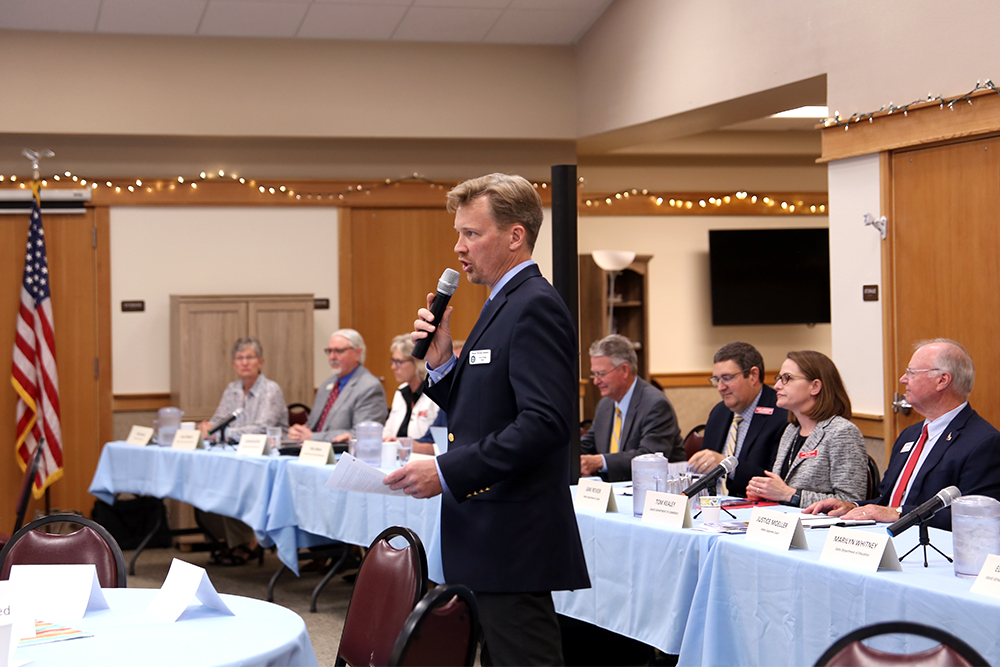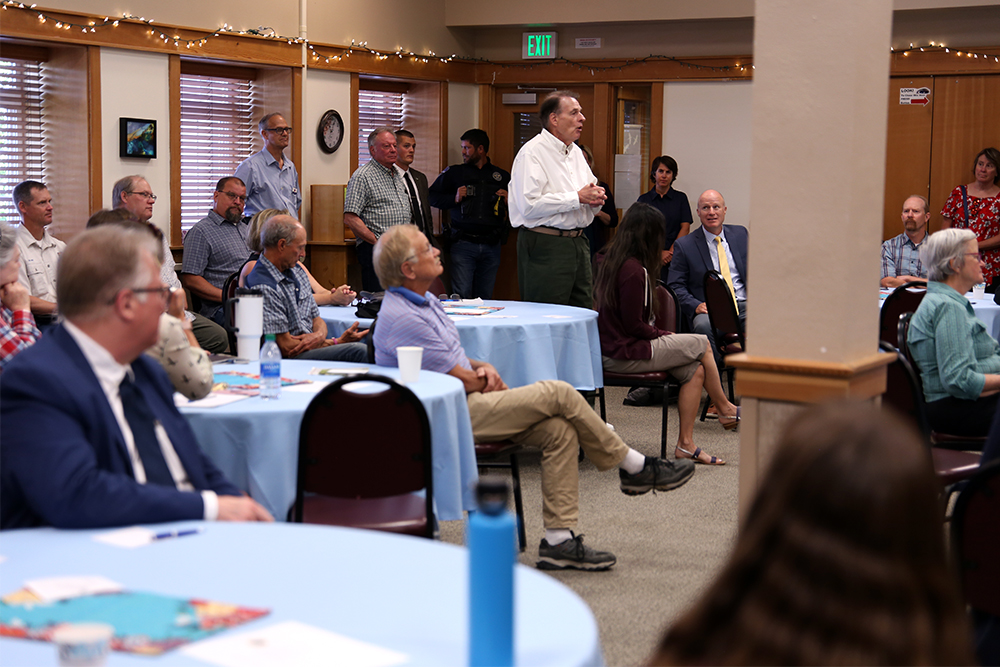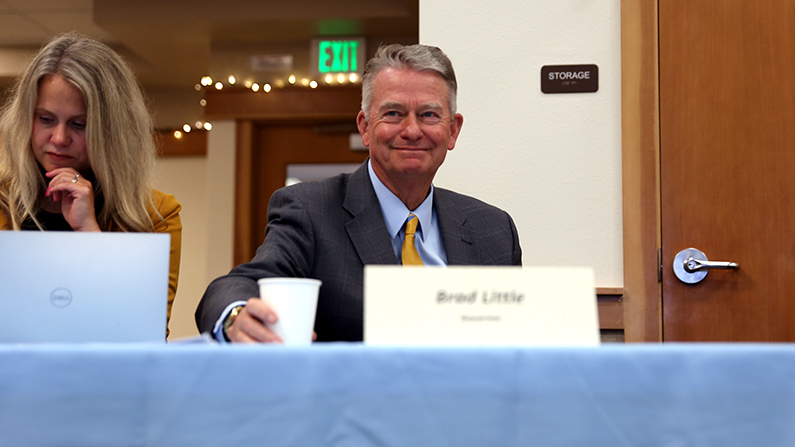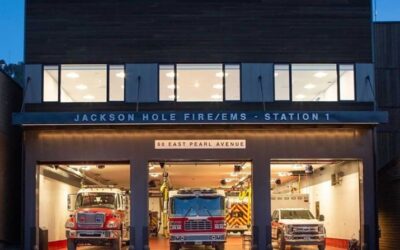KHOL News Director Kyle Mackie interviewed Idaho Gov. Brad Little during his first ‘Capital for a Day’ event since the start of the pandemic in Driggs on Tuesday, June 22.
The event offered an opportunity for Driggs and Teton County, Idaho, residents to ask questions of the governor and several members of his administration, including the state’s directors of parks and recreation, fish and game, agriculture and financial management. The issues raised by residents ranged from concerns over Teton County’s new Land Development Code to the expansion of Grand Targhee Resort in Alta, Wyoming.
Mayor Hyrum Johnson of Driggs also gave opening remarks at the start of Tuesday’s event, focusing his comments on the dire housing shortage in Driggs and Teton Valley and pleading to the governor to act as “the adult in the room” in Idaho as the state legislature increasingly moves to embrace far-right, often antigovernment policies.
The following interview transcript has been lightly edited for clarity and brevity.
KYLE MACKIE: This is the first ‘Capital for a Day’ event since before the pandemic. Why start with Driggs today?
GOV. BRAD LITTLE: Well, it really wasn’t—we try and rotate ends of the state that we go to. And I assume the last place we were was either in Treasure Valley or up north. And I was [at] one with Gov. Otter, I believe we were in Victor. And I don’t think I’ve been to one in Driggs yet.
MACKIE: Well, as I told you before we started recording, I live in Victor. I’m a Teton Valley resident. One of the biggest issues, I think, here in Teton Valley right now is a lack of affordable housing. I’ve heard from the mayors of both Victor and Driggs that the cities themselves are having trouble hiring employees. We know this is an issue, too, across the state. I wanted to ask you, you know, how are you—how’s your administration trying to tackle this housing shortage?
LITTLE: Well, side note: Mayor Johnson just told me this morning that they’ve got employees that work for the city that are living in Jackson Hole and commuting this way instead of commuting the other way. But it’s—this [is a] systemic problem that’s everywhere in Idaho. Nobody thought that for every 100 people working pre-COVID today in Idaho today we’d have 112 working. We’re victims of our own success. And nobody thought housing prices were going to be going up at 20 to 40% a year.
And it’s just hard, and you just can’t snap your fingers and build houses. Lumber prices were record high—they’re going down. [The] workforce is very scarce, particularly contractors, skilled contractors, plumbers, HVAC. I was just talking to the president of Eastern Idaho College. We’re doing a lot of work in the career technical area, but you have to build these things from the ground up. You’ve got to have materials, you’ve got to have zoned lots that are ready to go. We got a company in Idaho that’s using robots to build housing, but they’re all going to California because the Delta, there’s a $100 square foot bonus to go to California. Once after you get it built, put it on the truck, the freight is nothing. And so, I am sure that modular housing will be part of the solution. We just got to build more housing. But then, you know, just allow the creative genius of entrepreneurs to, you know, take an old warehouse, take an old retail property and convert it into housing. That’s going to happen.

Driggs Mayor Hyrum Johnson delivers opening remarks at the ‘Capital for a Day’ event on June 22. (Kyle S. Mackie/KHOL)
MACKIE: I read recently that the city of Ketchum is proposing a tent city downtown for middle-class workers. People with what should be stable jobs. I mean, how can we have that in 2021 that—and I’ll tell you, my colleagues in Jackson, we were saying, ‘That’s Jackson, really, in a couple years, too, maybe.’ What kind of solutions might work for those people in the meantime, right now?
LITTLE: Well, in Ketchum, the Sun Valley Company, they’ve been building housing there. Dormitories and really nice, high-quality housing for their employees. But that doesn’t help the coffee shop or the restaurant. And they’re going to have to go together to aggregate that. McCall, Idaho another resort community, the owner of the big resort up there went to New Meadows and basically put in a subdivision for their workforce. It’s just difficult. But, you know, Idaho has been discovered, particularly these resort communities, and we just got hyper demand.
You know, a lot of restaurants are now only opening three days a week. They’d love to be open seven days a week, but they just can’t get the workforce. But again, we’re victims of our own success. But nobody—well, maybe a year ago we were starting to see it—but nobody 14 or 15 months ago thought this was going to be the case, and we’ll get through it. But it’s going to be—you know, I just hate to see people lose their homes. The mayor was just telling me about a couple of employees that were in rentals. The people that own those rentals are converting them into Airbnbs, and that’s part of the issue. But in some instances, one business is going to buy another business just for their employees.
MACKIE: Right. Well, I’m glad you mentioned Airbnbs, because that’s something I wanted to ask you about. I know that I think you were Lieutenant Governor at the time when the state legislature put through House Bill 216, which I believe—you can correct me if I’m wrong—but it sort of restricts the ability of local municipalities to restrict Airbnb rentals. Do you see any future of those regulations changing so that local cities, places like Driggs—?
LITTLE: Did that get across the finish line?
MACKIE: Yeah.
LITTLE: Well, funny because the last time we had ‘Capital for a Day’ in Victor, the big issue was a hotel was paying their bed tax, and the Airbnb sitting right next to them was not. We fixed that since then. And the Airbnb, which, you know, is a great model—I wish I would have thought of it—but it’s just changed so many things about. And, you know, if you’re had a home, whether you’re a year-round resident or a traditional resort person in Idaho that spent part of your summer in Driggs or wherever it was, and now you’ve got these Airbnbs next to ‘ya where they’re filled up every night. Well, if you fill up the Airbnb every night, that means the restaurant’s full every night. That means the bar’s full every night. That means services, and the market’s going to have to adapt to that.

Teton County, Idaho, residents asked questions of Gov. Brad Little and members of his staff on Tuesday, June 22. (Kyle S. Mackie/KHOL)
MACKIE: So, we know that the initial statewide 2020 census data that we got showed that Idaho was among the fastest-growing states in the country. We’re based in Wyoming. Obviously, we see the opposite trend in Wyoming. Alot of outmigration and very slow growth. What do you think makes Idaho so popular, especially even in this last year and change of the pandemic?
LITTLE: Well, for the Census, we’re right behind Utah. But in the last year and a half, we’re actually quite a bit—we’re the fastest-growing state. But a lot of it’s just the diversity. Diversity in job opportunities. Diversity in great outdoor activity. You know, the COVID closedown exposed people to the great outdoors all over the West. And in Idaho, we were big beneficiaries of it. Now we’ve got to manage it.
Those of us who have been here all our lives are used to going out on the public land somewhere and being isolated. And now we’re sharing that with people from, literally, in some instances all over the world. And we’re going to have to do a better job of managing it. Our director of the Department of Fish and Game’s here today. I’m sure he’ll get people that used to go into their own private deer hunting or bird hunting site. Now, there’s other people there. We’re going to have to manage that. But again, we’re just victims of our own success, whether it be growth in jobs, growth in new industries, a growth in tourism—they’re all growing. But believe me, I remember the last recession where we had 100,000 people out of work in Idaho and I like this problem better than that problem.
MACKIE: Okay, well, that gets into my next question. If you could choose, do you want more people to continue moving here? I believe you’ve been a big investor in broadband across the state and wanting to get more remote workers to move, not necessarily to the Driggs and the Boises of Idaho, but to smaller communities that may have more capacity to accept newcomers.
LITTLE: That is really not a question for me. It’s a question for the local community—the Teton County Commission, the Driggs City Council, planning and zoning, the local school board. These decisions are best left at the local level. And what my job is is to allow them to have the tools to do what they need to do. That’s why I just did a kind of a walkabout with the mayor on what they’re doing with grants for infrastructure, grants for broadband expansion. But growth, if the residents of a city said, ‘We don’t want anybody else moving here’ and selected their city council and county commissioners based on that, then there’d be no growth. And it’s up to local government. That’s why people need to be involved in local government.
MACKIE: What are the other issues with Idaho that keep you up at night? What are your biggest priorities?
LITTLE: Well, we need to get more people vaccinated. We go into the fall—in Idaho we had our kids in school about as much as any state, but we need everybody back in school next year. That’s going to be critical. Continue to invest in education, particularly early childhood education and literacy. That’s what I was doing before COVID hit, and that’s what I’m doing now. And then also addressing a lot of the behavioral health challenges we have in the state.
MACKIE: Alright, well, thank you, governor. I think my time is up. Greatly appreciate your time this morning.
LITTLE: Nice to meet you. Bye bye.
MACKIE: Nice to meet you too.





